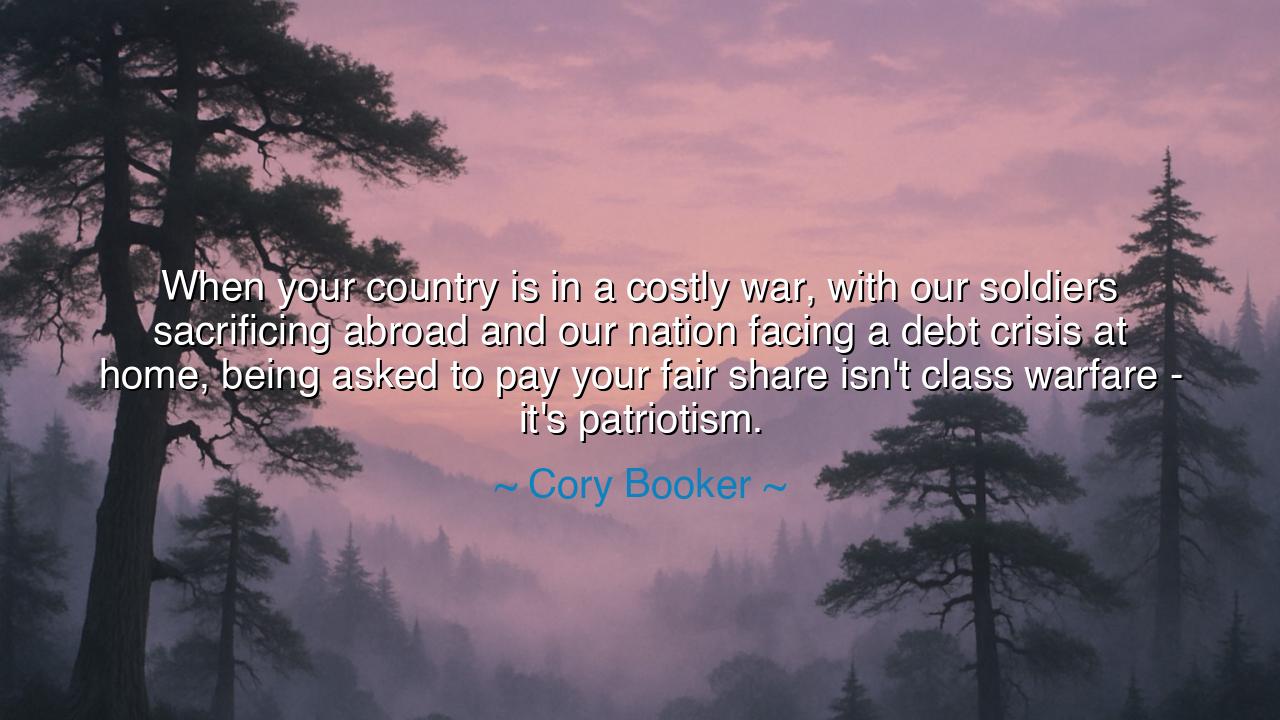
When your country is in a costly war, with our soldiers
When your country is in a costly war, with our soldiers sacrificing abroad and our nation facing a debt crisis at home, being asked to pay your fair share isn't class warfare - it's patriotism.






The words of Cory Booker—“When your country is in a costly war, with our soldiers sacrificing abroad and our nation facing a debt crisis at home, being asked to pay your fair share isn’t class warfare—it’s patriotism.”—resound with the weight of duty and the fire of justice. They remind us that patriotism is not only measured in the clash of arms or the waving of flags, but also in the willingness of citizens to bear the burdens of sacrifice together. For a nation is not upheld by soldiers alone, nor by leaders alone, but by the shared responsibility of every heart and hand.
Booker speaks to a time when America faced both war abroad and crisis at home, a double trial of arms and of treasure. The cost of conflict is not counted only in lives, but in the wealth of the nation, in debts owed, and in futures mortgaged. To ask citizens to contribute their fair share is not an act of division, but an act of unity. For when the soldier risks his body in foreign lands, it is just that the citizen risks his gold at home. To refuse this is not freedom, but selfishness; to accept it is not oppression, but devotion.
History offers us countless witnesses to this truth. Recall the days of World War II, when America not only sent its young men into battle but also called upon its citizens to accept rationing, war bonds, and higher taxes. Housewives collected scrap metal, children gathered rubber for tires, and families learned to live with less so that the frontlines could endure with more. No one called it class warfare; it was understood as patriotism—a shared sacrifice that bound together the soldier in the trench and the worker in the factory. It was the unity of sacrifice that made victory possible.
In contrast, nations that have failed to share their burdens have found themselves broken. In the waning days of the Roman Republic, while legions fought abroad, the wealthy elite resisted sharing their fortunes for the common good. Inequality deepened, unrest grew, and the republic crumbled into empire. Their refusal to pay their fair share of the republic’s survival proved more destructive than the swords of their enemies. Thus, Booker’s words echo across centuries: the refusal to sacrifice together weakens a nation more surely than any foe.
The deeper wisdom in this teaching is that patriotism is not a matter of privilege, but of equity. To wave the flag while hoarding wealth is to mock the meaning of the flag itself. But to give, to contribute, to uphold the common good—even when it hurts—is to embody the very spirit of the soldier who bleeds for his homeland. True patriotism does not ask, “How much can I keep?” but, “How much can I give so that my nation endures?”
For us, the lesson is plain: in times of trial, do not see sacrifice as theft, but as an offering of love. If your nation struggles, give what you can—whether wealth, labor, or time. Support those who fight, not only with words, but with deeds that ease their burden. Demand fairness from leaders, that sacrifice be shared by all and not carried by the poor alone. In this way, you become not only a citizen of a land, but a guardian of its soul.
Practically, this means cultivating a spirit of service in daily life. Pay what is just, give when called, and do not shrink from the burdens that preserve the whole. If asked to bear more, remember those who bear the ultimate sacrifice on distant fields. Let every act of contribution be seen not as loss, but as a sacred share in the great work of preserving freedom.
Thus, let Booker’s words burn within you: patriotism is not the refusal to share, but the courage to do so. In war and in debt, in hardship and in peace, the nation survives only when its people bind themselves together in sacrifice. To pay your fair share is not surrender—it is strength. It is not class warfare—it is the truest form of love for one’s country.






AAdministratorAdministrator
Welcome, honored guests. Please leave a comment, we will respond soon